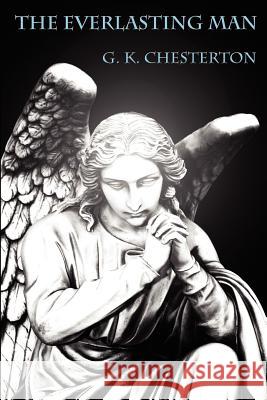The Everlasting Man » książka
The Everlasting Man
ISBN-13: 9780987158116 / Angielski / Miękka / 2012 / 212 str.
The Everlasting Man
ISBN-13: 9780987158116 / Angielski / Miękka / 2012 / 212 str.
(netto: 56,72 VAT: 5%)
Najniższa cena z 30 dni: 58,57
ok. 16-18 dni roboczych.
Darmowa dostawa!
The Everlasting Man is a two-part history of civilization, Christ, and Christianity, by G. K. Chesterton. Originally published in 1925, it is to some extent a deliberate rebuttal of H. G. Wells' Outline of History, disputing Wells' portrayals of human life and civilization as a seamless development from animal life and of Jesus Christ as merely another charismatic figure. Whereas Orthodoxy detailed Chesterton's own spiritual journey, in this book he tries to illustrate the spiritual journey of humanity, or at least of Western civilization. Considered to be Chesteron's finest work, he traces evolution not in terms of biology, but in terms of civilization. Chesteron's insights will leave the reader to wonder if the assertions of materialist history are true, or if we are overlooking another aspect of civilization, in which humanity has always been evolved. Beginning with primordial life in the cave, Chesterton questions if our ancestors were mere primitives, or if humans were effectively 'hard wired' from the beginning to be a spiritual animal. Chesterton will take the reader on a lightening tour through Ancient Greece, Rome and the Middle East in order to examine Christianity and polytheistic movements which existed side by side. The Everlasting Man is not only of value to the Christian reader, but also adherents of polytheism, as it also provides
The Everlasting Man is a two-part history of civilization, Christ, and Christianity, by G. K. Chesterton. Originally published in 1925, it is to some extent a deliberate rebuttal of H. G. Wells Outline of History, disputing Wells portrayals of human life and civilization as a seamless development from animal life and of Jesus Christ as merely another charismatic figure. Whereas Orthodoxy detailed Chestertons own spiritual journey, in this book he tries to illustrate the spiritual journey of humanity, or at least of Western civilization.Considered to be Chesterons finest work, he traces evolution not in terms of biology, but in terms of civilization. Chesterons insights will leave the reader to wonder if the assertions of materialist history are true, or if we are overlooking another aspect of civilization, in which humanity has always been evolved. Beginning with primordial life in the cave, Chesterton questions if our ancestors were mere primitives, or if humans were effectively hard wired from the beginning to be a spiritual animal.Chesterton will take the reader on a lightening tour through Ancient Greece, Rome and the Middle East in order to examine Christianity and polytheistic movements which existed side by side.The Everlasting Man is not only of value to the Christian reader, but also adherents of polytheism, as it also provides











